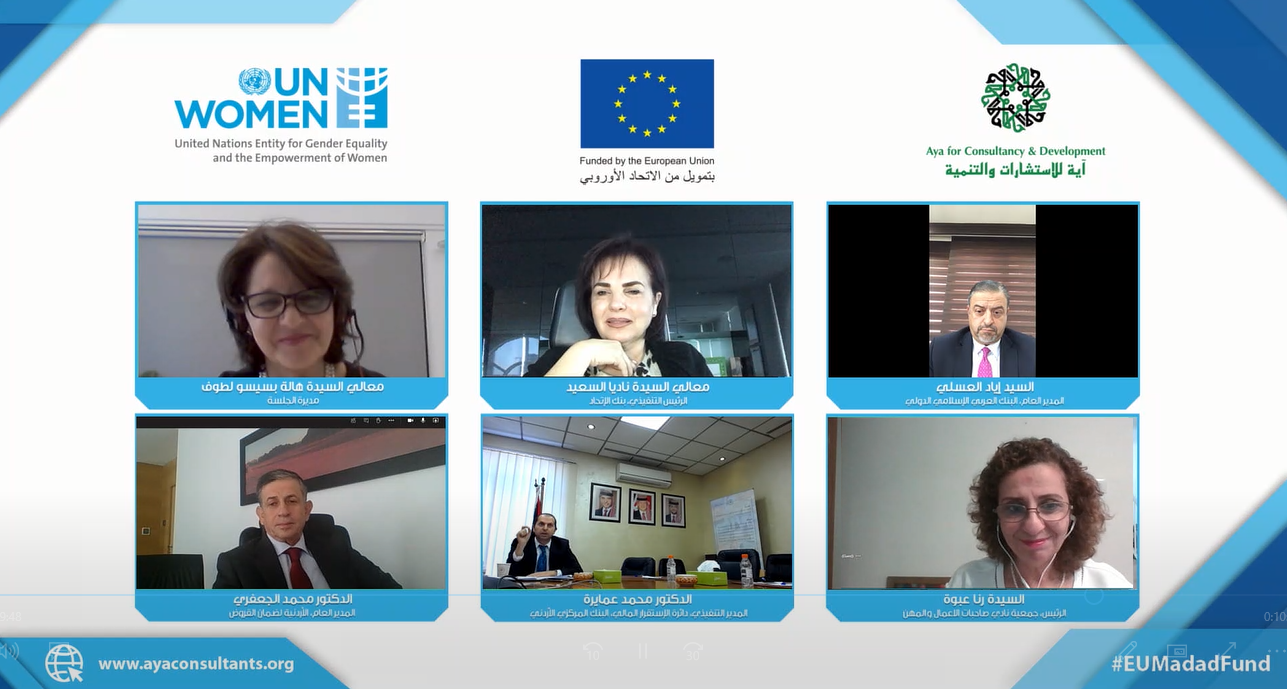UN Women holds a dialogue on gender-responsive financial services in Jordan
Date:

Under the Patronage of His Excellency Ziad Fariz, Governor of the Central Bank, UN Women, in collaboration with Aya Consultancy, organised a dialogue on an assessment on the financial needs of women entrepreneurs in Jordan. The assessment provides recommendations to governing bodies and financial institutions in the kingdom for increasing financial inclusion of women. The assessment was developed in partnership with Aya Consultancy as part of a UN Women’s programme generously supported by the European Union, through the EU Regional Trust Fund in response to the Syria Crisis, the EU MADAD Fund.
The findings of the assessment were discussed in an event held on Tuesday, September 22, 2020, in collaboration with the Central Bank of Jordan (CBJ). During the event, UN Women underscored the primary objective of the assessment and its umbrella programme, which is to encourage greater development of gender-responsive financial services in Jordan and to promote discussion among policymakers and financial institutions on the accessibility of financial services to women entrepreneurs in the kingdom, particularly women from vulnerable segments of the population.
“This initiative by UN Women and the EU, as well as the overarching mission of its programme, are directly in harmony with the Central Bank of Jordan’s Financial Inclusion Strategy, which has so far been successful in making significant progress in decreasing gender gaps within the financial sector,” commented Dr. Adel Al-Sharkas, Deputy Governor at CBJ. “In any society, gender-responsive financial services are considered paramount to long-term economic development and stability The findings of this assessment provide an evidence-based for banks on the importance of better understand the needs of local women entrepreneurs and the products and services that will help them establish viable, successful business ventures.” Dr. Adel added that the CBJ procedures concerning consumer protection and spreading financial and banking literacy in society are in place and will have a positive role in empowering women both financially and economically.
The key findings in the assessment show a clear gap in both the targeted financial services being offered to women and the overall level of support that women feel when attempting to access viable financing. This indicates a clear need for sustainable and far-reaching solutions within the sector to ensure that all segments of the community are adequately represented during the product development process. The assessment also notes a need for systemic changes and shifts in social norms to further empower women financially and increase the opportunities available to them in terms of accessing business-focused financial services.
According to Hala Bsaisu Lattouf, founder of Aya Consulting, “the assessment highlights many of the underlying issues connecting financial inclusion and gender equality, particularly when it comes to women from vulnerable communities. Moreover, by showcasing existing gaps between needs and product availability, it demonstrates how the development of gender-responsive products that are accessible to women is also considered good business as it helps widen the customer base of local service providers, thereby promoting business growth in this vital sector.”
Rana Abweh, the President of Business and professional Women-Amman (BPWA), emphasized the importance of the assessment and its findings, particularly with regards to the need for gender-responsive financial and non-financial services. “As demonstrated by this assessment and our direct experience with women entrepreneurs nationwide, there are significant challenges impeding the financial empowerment of women, including the lack of financing opportunities that are tailored to meet their specific needs. Working on designing gender specific programs and initiatives will empower women and strengthen their opportunities in getting the financing they need to fund their projects and achieve financial autonomy, thus allowing them to provide for themselves and their families. It also reinforces economic resilience on a wider scale by creating a more human-centric system focused on leadership and empowerment as opposed to indebtedness.”
The objectives of the assessment and its umbrella programme funded by the European Union, Strengthening the Resilience of Syrian Women and Girls and Host Communities in Iraq, Jordan and Turkey, have become even more relevant in the age of the COVID-19 pandemic, which has added an entire layer of complexities to the economic challenges impacting communities throughout the kingdom, particularly vulnerable populations.